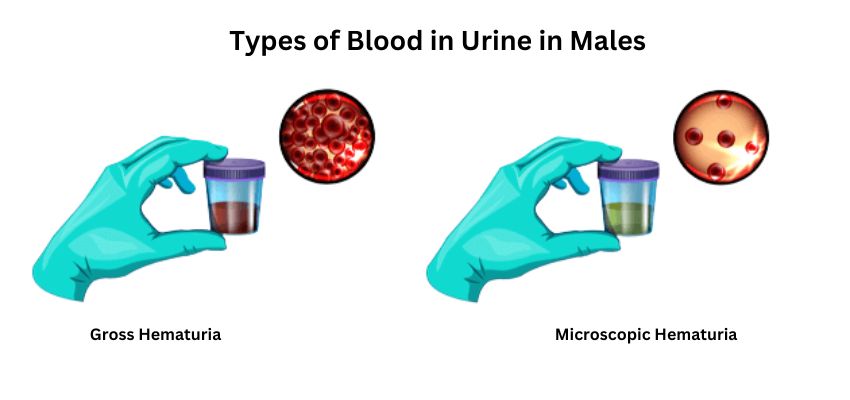The problem of getting Blood in Urine in Males is called Hematuria in medical language.
Many different conditions and diseases can cause Blood in Urine in Males (Hematuria). These include infections, kidney disease, and cancer, as well as rare blood disorders.
Blood may be visible in the urine, or it may be in such a small amount that it is not possible to see it with the naked eye.
Any amount of Blood in Urine for males can signify a serious health problem, even if it occurs only once.
Ignoring Hematuria can make serious conditions like cancer and kidney disease worse, so you should talk to your doctor as soon as possible.
The doctor can properly analyze your urine and recommend imaging tests to determine the cause of Hematuria and plan treatment.
What are the types of Blood in Urine in Males?
There are two types of Blood in Urine for Males, microscopic and gross.

Gross Hematuria
If there is so much Blood in Urine in Males that it appears pink or red or has streaks of blood, you have “gross Hematuria”.
Microscopic Hematuria
When you don’t see blood in urine in a male because it’s in very small amounts, you have “microscopic Hematuria.” Only a lab test that can detect the presence of blood in a sample can confirm microscopic Hematuria.
Blood in urine in Males Causes
There are many possible causes of Blood in Urine in Males. In some cases, blood can get into the urine from a different source.
If blood is only in your urine, there are several possible causes, such as:
Urinary Tract Infection
Blood in Urine in Males is most commonly caused by urethral infection. Infection can occur anywhere in your ureters, bladder, or kidneys.
This infection occurs when bacteria move up that carries urine out of the body. This infection can spread to the bladder and even the kidneys. This often causes painful urination and frequent urination.
Calculus
Another common cause of blood in urine in males is the presence of stones in the bladder or kidneys. These are crystals that form from minerals present in your urine. It can develop inside your kidney or bladder.
Large stones can cause obstruction of the urethra, often resulting in extreme pain and Hematuria.
Enlarged Prostate Gland
In men of middle age and older, a common cause of Blood in Urine in males is an enlarged prostate gland. This gland is just below the bladder and near the ureter.
When the prostate gland becomes enlarged, as often happens in men in middle age, it can put pressure on the ureter and narrow it. This causes difficulty in urinating and the bladder is unable to empty completely.
This results in the person having a urinary tract infection as well as blood in his urine.
Kidney Disease
A less common of blood in urine in males Causes is kidney disease. A diseased or Swollen kidney can cause Hematuria in a person. The disease can occur by itself, or it can develop due to a disease such as diabetes.
In children ages, 6 to 10, a kidney disorder called post-streptococcal glomerulonephritis can cause Hematuria. This is an autoimmune disorder that occurs when a child’s sore throat goes untreated for one to two weeks. However, this disorder is quite rare these days, as sore throats can be easily treated with antibiotics.
Cancer
Bladder, kidney, or prostate cancer can also cause blood in urine for males. This is a symptom that often occurs in the advanced stages of cancer. This is not an early symptom of cancer.
Medicines
Some drugs can cause Hematuria. Some of the most common are:
- Penicillin
- aspirin
- blood thinners such as heparin and warfarin
- cyclophosphamide, which is a medicine used to treat some types of cancer
Least Common Factor
There are some other factors of Blood in Urine as well, which are not very common. Rare blood disorders like Alport syndrome and sickle cell anemia can lead to blood in the urine.
Vigorous exercise or trauma to the kidneys can also cause blood in the urine.
How is the cause of Blood in Urine in Males identified?
If you see a doctor with Hematuria, he or she will ask you about the amount of blood in the urine and when it comes out during urination.
He’ll also want to know how often you urinate, any pain you’re experiencing, whether you notice blood clots, and what medications you’re taking.
The doctor will then do a physical examination of you and take a urine sample for lab tests. Lab tests of your urine can confirm the presence of blood in it and detect the presence of bacteria if there is an infection.
Your doctor may also recommend imaging tests, such as a CT scan, which uses radiation to create an image of the inside of your body.
Another possible test that your doctor may want to order is a cystoscopy. In this test, a small tube with a camera attached to it is inserted into your urethra. Using a camera, the doctor can examine the inside of your bladder and ureters to find the cause of Blood in urine in males.
When should I see a doctor?
Since some causes of blood in the urine are serious, you should see a doctor the first time it appears. You should not ignore even the smallest amount of blood in your urine.
If you do not have blood in your urine, but you experience frequent, difficult, or painful urination, as well as abdominal pain or kidney pain, you should still see a doctor.
If you are unable to pass urine, are passing blood while urinating, or are seeing any of the following along with blood in your urine, seek emergency medical attention right away:
- nausea
- Vomit
- Fever
- chills
- you have pain in your hip, back, or abdomen
How is Blood in Urine for Males Treated?
The cause of your Blood in Urine for Males will determine what type of treatment you need.
If an infection, such as a urinary tract infection, is to blame for your Hematuria, a doctor will prescribe antibiotics to kill the bacteria causing the infection.
Hematuria caused by large kidney stones can be quite painful if left untreated. Prescription medicines and treatments can help you pass your stones.
The doctor may suggest using a procedure called extracorporeal shock wave lithotripsy (ESWL) to break up the stones.
ESWL uses sound waves to break the kidney stone into small pieces. The procedure usually takes about an hour and you may be given mild sedation during this time.
The doctor may also use an instrument called a ureteroscope to remove your stones. This device has a camera attached to it which helps to locate the stone. If the stone is big, then it will be broken and taken out.
If you have Hematuria due to an enlarged prostate, your doctor may prescribe medications, such as alpha-blockers or 5-alpha reductase inhibitors. In some cases, surgery may be required.
What are the possible complications associated with Hematuria?
Some causes of blood in the urine are serious, so you should contact a doctor immediately if you notice these symptoms.
If the cause is cancer, if ignored, the tumor may grow to such an extent that treatment becomes difficult and costly.
Untreated infections can eventually spread to the kidneys.
If an enlarged prostate is causing Hematuria, treatment can help reduce symptoms. Ignoring it can lead to frequent urination, severe pain, and even cancer.
How do I prevent Hematuria?
Preventing Hematuria means stopping its underlying causes:
- To prevent infection, drink plenty of water daily, urinate immediately after intercourse, and practice good hygiene.
- To prevent stone formation, drink plenty of water and avoid high salt and certain foods like spinach and cinnamon.
- To lower your chance of bladder cancer, avoid smoking, limit exposure to chemicals, and drink plenty of water.


